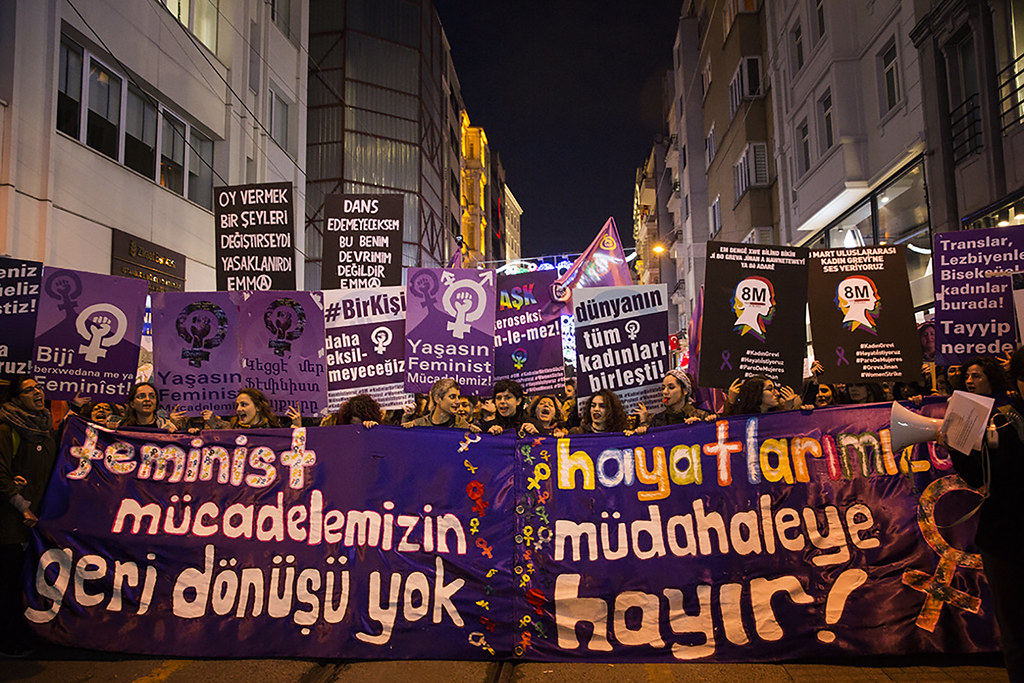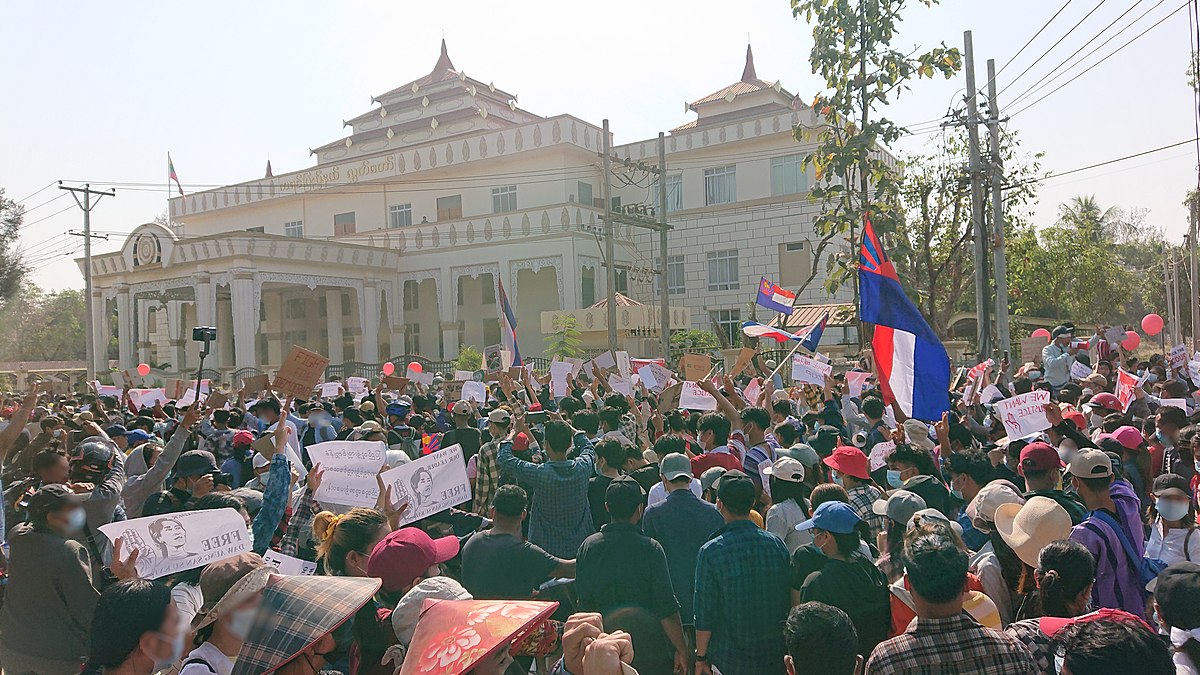Kadina Siddet Hayir: No to violence against women
Under a presidential decree, Turkey withdrew from the Istanbul Convention. Will this be a threat to women’s rights?
The Istanbul Convention, also known as the European Convention, is a human rights treaty drafted by the Council of Europe. Its purpose is for the protection from domestic violence and violence against women. It has been signed by 45 countries and ratified by over 30. Turkey was the first country to ratify the convention, but on March 20, 2021, Turkey withdrew from the convention on the basis of a presidential decree.
This sparked protests in opposition to the action, as femicides and violence against women and children is an issue in Turkey that is not tended to properly. Anit Sayac — a data website — has shared the number of women killed in Turkey since 2008, as well as their names. In 2020, 409 women were killed in total. In 2021, the number has already reached 90.
We Will Stop Femicide is an online platform that advocates for women’s rights in Turkey. As stated on their website, they note “We Will Stop Femicide Platform has the status of legal person. We continue our efforts for the association to gain the status of ‘public benefit association’. The founders of the Platform are the families of our sisters who were murdered, women from various political parties, bar associations, business associations, trade unions and other organizations, as well as independent women.”
On their website, they have a 2020 data report showing the relationship victims had to their attackers. 32% stemmed from their husband, 18% was their partner and 13% were acquaintances. The 2020 report also helps us to better understand the victims. The ages of 40% of women killed ranged between 36 to 65 years, 24% were 25-35, 11% were 19-24, 4% were 66 and over, 3% were 15-18 and 3% were 0-11. 60% of women were killed in their homes while 16% were in the streets.
Hacettepe University released a report that revealed 36% of married or previously married women have at least once in their lifetime been subjected to physical violence.
The percentage of the perpetrators being prominently the women’s husbands and partners are upsetting. A partner or spouse is someone you should be able to trust and love, someone you can feel safe with. When that safety is taken away and becomes replaced with violence, the love diminishes.
Women in Turkey wanting to divorce their husbands and leave a relationship needs to be normalized. Society can be judgmental when it comes to women leaving men and their “honor” oftentimes suffers due to these actions. Women should not be subjected to consequences when making the best decision for their happiness, health and wellbeing.
There are so many stories and incidents of femicide and violence against women. Violence against women is not being taken seriously in Turkey, so feminists and activists are taking it to the streets in there and around the world to emphasize each individual whose innocent human life was taken in Turkey.
Vahit Tuna, an artist from Turkey, placed 440 heels on the walls of a building in a busy street in Istanbul. “We are standing in a street now and maybe people are faced with a work of art for the first time, an open and bleeding wound for the very first time. I believe this has an impact,” said Tuna to Reuters. The number of heels represents 2018’s reported number of women killed due to domestic or sexual violence.
Justice needs to be served to these women, and women who are currently being abused. Legislation needs to be passed so the safety of women is ensured in Turkey. The current structure that addresses the violence against women is lacking, which is why women have to think of their own safety and protection.
Onedio, which is a social content platform, has a Youtube video in Turkish titled “8 Methods Women Develop to Protect Themselves From Harassment.” In the video, the female character who lives alone is shown taking many safety precautions, such as placing mens shoes outside her door, writing a male name on paper and placing it on her door, pretending her father is home when the food delivery man comes and pretending to talk to her father on the phone when a man is walking behind her.
We are taught methods like these in order to protect ourselves, especially out in public. We are taught to protect ourselves in a way that centers males, and places the responsibility to be vigilant on our shoulders. If these issues become prioritized to begin thinking of long term solutions, the feeling of constant fear will diminish so utilizing the methods from the video in real life will no longer be necessary.
Emine Bulut’s story is an example of the violence and murders women face in Turkey. Bulut was a mother who lived in Turkey with her 10-year-old daughter. In 2019, Emine was having lunch with her daughter in Kirikkale, when her ex husband of four years came and started an argument regarding the custody of their child. Things quickly escalated and he stabbed her in the neck before he fled, and as Emine held onto her neck saying “I don’t want to die,” her daughter pleaded for her mother not to. Unfortunately, Emine later died in the hospital at the age of 38.
“Since then more people have been joining the movement for women’s rights. Our fight has been spread across borders and throughout society. Women’s demands to not be killed or subjected to violence has become a widespread social request,” said Gulsum Kav, a representative of We Will Stop Femicide — a women’s rights platform — to BBC in their article “Emine Bulut: Anger in Turkey over mother’s murder.”
Children are also heavily affected by these femicides, as their mothers are killed and they see women being abused in their homes or on the streets, this impacts their psychology and socialization. And more often than not, when they grow older, they possess this childhood trauma that has roots in what happened to their mothers and the abuse they witnessed.
In an interview with Al Jazeera, Turkish-British novelist and women’s rights activist, Elif ?afak discusses the issue of femicides, specifically she emphasizes that the numbers are actually much higher than what is reported. “This is an emergency for us.”
She states, “The fact that the government is not supporting this and is doing the exact opposite, to me is just unthinkable.”
She is right, this is an emergency. If the law does not recognize the perpetrators and the crimes being committed against women and children, this abuse will continue to be kept a secret.
One of the reasons why the Istanbul Convention was withdrawn was because of claims that it promoted homosexuality. “Conservatives in Erdogan’s Justice and Development Party have said the convention, which stresses gender equality and forbids discrimination on grounds of sexual orientation, undermines family structures and encourages violence,” said Al Jazeera in their article “Thousands protest Turkey’s exit from domestic violence treaty.”
Despite these claims, the convention itself does not mention the definition of family. Beyond that, 67% of the society supports the Istanbul Convention, while 17% are against it despite claims otherwise.
Information regarding the misconceptions of the Istanbul Convention, such as this one about public support, can be found on @kiz_basina, a social responsibility online platform on Instagram advocating for the reduction of violence on gender inequality in Turkey.
Women’s rights need to be prioritized in Turkey. This is a serious topic that needs a long term solution for the protection of women and children. Holding perpetrators accountable, helping women heal from their trauma and teaching children the difference between healthy and toxic behavior is something that needs to be focused on.



